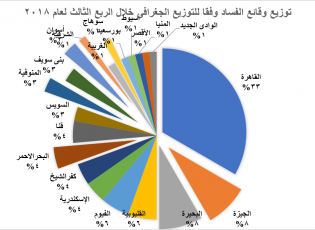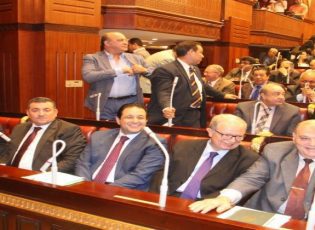Masrawy:
I wrote - Hajar Hosni:
George Ishaq, a member of the National Council for Human Rights, said that the council decided during its last monthly meeting, last Wednesday, to make amendments to the protest law, in order to develop a proposal to be submitted to the concerned authorities that will make amendments to the law in implementation of the recommendation that came out of the National Youth Conference that was held during the period Between October 25-26.
The Council had submitted a proposal to amend the law after it was approved in 2013 after the June 30 revolution, so Nasser Amin, head of the complaints committee at the National Council for Human Rights, said that these proposals relate to the abolition of the imprisonment penalty for violating the provisions of the law, and the abolition of all articles added from the penal code, such as criminalizing The use of weapons as they are already present in this law, in addition to amending the article on the authority of the Ministry of Interior to prevent demonstrations, which contradicts the principle of notification stipulated in the constitution.
Article 73 of the 2014 Constitution stipulates that citizens have the right to organize public meetings, processions and demonstrations, and all forms of peaceful protests, without carrying weapons of any kind, with notification in the manner organized by law, and the right to peacefully private assembly is guaranteed, without the need for prior notification, and it is not permissible. Security men may attend, watch, or eavesdrop on him.
Walaa Jad Al-Karim, president of Partners for Transparency, says that the most important articles that require an amendment are the right of the Ministry of Interior to object to demonstrations without a court ruling, and granting the right to the victim to file an appeal, in addition to the proportionality between the offense and the punishment because it does not Imprisonment may be applied to a person who demonstrates peacefully, except in relation to those who committed violence that are subject to the law, he said.
Sherif Hilali, Executive Director of the Arab Foundation for the Support of Civil Society, Rights and Human Rights, believes that there are several articles that must be amended, some of which stipulate the necessity of having a permit from the Ministry of Interior to approve the demonstration because it is inconsistent with the principle of notification, as well as the abolition of freedom-restricting penalties (imprisonment). Which is imposed widely and made to be minimal, such as the use of violence, in addition to the abolition of the articles added to the law from the Penal Code.
Medhat al-Zahid, Acting Chairman of the Socialist Popular Alliance Party, said that the proposals put forward by the party were the most prominent of which was to amend the article on obtaining a permit to complete the demonstration because it contradicts the principle of notification in the constitution, and forcing the Ministry of Interior to resort to the judiciary if it had an objection and not the body organizing the permit In addition to the abolition of all laws introduced into the law from the penal code, the articles related to heavy fines are also canceled.
Khaled Daoud, a spokesman for the Democratic Current Coalition, said that the coalition adopts all the proposals put forward by the National Council for Human Rights, adding that the most prominent of these amendments is the amendment of the article that stipulates the need for a permit from the Ministry of Interior to complete the demonstration, instead of the notification stipulated in the constitution, Likewise, articles on harsher penalties, especially since violent demonstrations have laws that criminalize them in the penal code.
Magdy Abdel Hamid, head of the Egyptian Association for the Advancement of Community Participation, expressed his lack of optimism about making real amendments to the articles of the Protest Law, saying that the government has known since the law put in place that it is a constitutional violation and yet it was approved, saying that the fear lies in the attempt of the committee that will make the amendments. To circumvent these modifications, but if it happens and the amendment is made it will be a good thing, according to him.
Naguib Gabriel, head of the Egyptian Union for Human Rights, disagreed with the previous opinion, saying that the amendments to the protest law will be real, and that the government is forced to make these amendments before considering the appeals against the unconstitutionality of the law and reserved for judgment next December, saying that the law caused In insulting the reputation of Egypt and many people were subjected to imprisonment.
Short link: https://pfort.org/en/?p=1870













